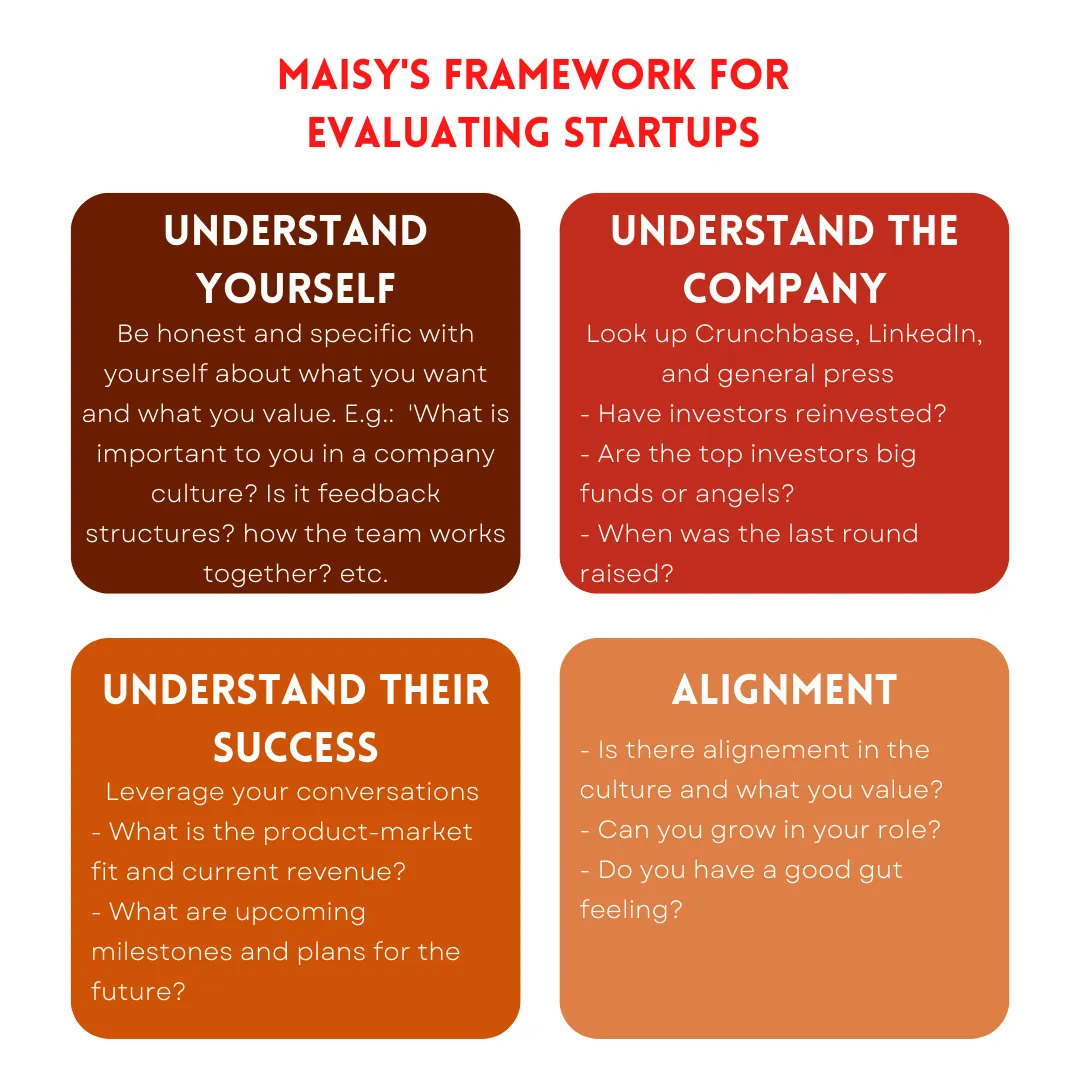So, you’ve decided to join the crazy world of startups. Congratulations and welcome!
The first step in bringing this decision to life is interviews. In the startup world, an interview can range from a formal discussion with a hiring manager to a chat over coffee with a founder. However, interviews can be uniquely challenging in the startup world because startups can vary in size and stages, from two people working towards a seed round, to over 100 employees working in a multimillion-dollar global company.
What’s key to remember, regardless of where you are in your career journey, is that an interview is as much of an opportunity for you to assess the startup as it is for them to assess you.
So, what red flags should you look out for and how can you spot them? In search of answers, I spoke with the following three startup operators:
- Ashlee Chapman – Chief of Staff at Vygo moving to startups from a career in management consulting and law;
- Robert Batchelor – Head of Biosensors at Nutromics with decades of operator experience in startups across the US and Australia; and
- Maisy Bennett – Leading special projects at Startmate after working with three early stage startups, and helping launch the first Techstars accelerator program.
Each of them also shared frameworks they’ve personally developed to assess startups, which I’ve shared at the end of this article!
🚩 #1: All pitch, no substance
Startups often have an alluring vision, by nature of being risk-taking and future-thinking, and their senior leadership will do a great job of delivering this vision. So how can you test if what they’re saying is true?
Ashlee: Ask for data. I always make it a point to ask for data that serves as evidence for the problem, market size and runway. All this information is usually available in an investor deck that you can ask to see. If you offer to sign a non-disclosure agreement and the startup still refuses to walk you through the pack, that’s a red flag.
Maisy: Understanding how successful a startup has been, its trajectory, and how likely this trajectory is, are the main areas that I seek clarity on from a startup. Defining 'success' varies based on the stage the startup is in, but broadly, some of the things I'd ask about are revenue, customer growth, customer churn, product-market fit, and how easy or hard it has been to fundraise. Then, I'd try to validate their answers. One way to do this would be to ask these questions to a few different team members or investors and see where there is a strong consensus versus. where there are inconsistencies.
Robert: Validate the information provided by asking questions externally. For example, if you’re assessing a biotech startup but don’t have a technical background yourself, reach out to your friends who do! You can do this to check claims about the problem, assess product-market fit, and generally get a second opinion on the company.
🚩 #2: High turnover and employee policy problems
Even in the early stages, startups should be thinking about employee retention and a desire to form and implement strong employee policies. However, this focus can be a notoriously hard one to spot. So what are the signs of problems with retention, culture and policies?
Robert: No company is perfect, but what you want to look out for is how the company talks about its ex-employees and how their ex-employees talk about them. Reach out to ex-employees on LinkedIn and ask them why they left, what they felt about the culture, and if they’d recommend the company. If the response is overwhelmingly negative, run. Similarly, if a company is happy to trash their ex-employees, that’s a huge red flag.
Maisy: Look for signs of early diversity in a company. This can be assessed by scanning their LinkedIn page. Ideally, they’ve either thought about diversity right from the start or they’re transparent about where they are at and are willing to make a change.
Ashlee: If a company doesn’t have any policies, first check how early stage they are. If they are relatively early, ask them how open they are to introducing policies. For example, if a parental leave policy is important to you, ask if you can create that policy and get support. This is something I was able to propose and lead at Vygo. The same goes for diversity and inclusion. If there is a lack of diversity in a team, first try to explore the reasons behind that and next test the startup’s openness to change.
🚩 #3: Bad gut feeling
An interview process is when both startups and candidates put their best foot forward, so if you have doubts now, they are unlikely to disappear later. So, what are some ways to know if your bad gut feeling is real?
Maisy: At the end of the day, whether you resonate with a startup’s people and culture will have a huge impact on your decision to join a company, and whether you will remain at a company. A career in startups is typically a higher risk, higher reward career, where you are working towards the company’s mission and vision. If those do not resonate with you or you’re having doubts about them early on, trust how you feel!
Robert: Throughout the interview process, you want to assess the tone of your interactions. For example, when negotiating a salary do they just say ‘no’ the minute you make your offer or do they take the time to consider it and be transparent about the factors influencing their offer? If you’re not treated with respect through the process or do not like the tone of interactions, then the startup may not be a right fit.
Ashlee: Ask to speak to other employees during your interview process. Make sure to speak to people you will work with every day and sense-check facts with other employees. This way you’ll have a much better idea of what life in the startup is really like and you can see if it aligns with your goals and where you want to be.
🚩 #4: Probationary period blues
Sometimes the best way to know if a startup is the right fit or not is by working there. This is where a probationary period can be your best friend, because you can use this time to evaluate how you feel in the company. What are some things you can do during your probationary period to evaluate fit?
Ashlee: The probationary period is a great time to understand how a team operates and what the startup’s culture looks like in action. Also look at people who are ahead of you and how they feel about the work they’re doing and their professional development. Finally, use this time to observe and understand employee and customer churn.
Maisy: Use your probationary period to evaluate whether the company culture, people and ways of working are a fit for you. One easy thing to do is to ask multiple leaders similar questions to see if they are in alignment, or whether there are clear gaps that need to be addressed. You can use this time to see if the picture that has been painted about the startup is grounded in reality or not.
Robert: Once you join a startup try to learn about the founders, product-market fit, direction, and culture quickly. If the startup is still figuring out too many high priority items, chances are that their success will be limited.
At the end of the day, startups can be a high-risk, high-reward career path. Just like with any role, learning and growth on the job are key along with creating a greater impact through your work.
It’s best to take off rose-tinted glasses while evaluating startups, lest all the red flags look just like regular flags!
Frameworks for success
For ease of use, you can download a worksheet version of this framework here.











